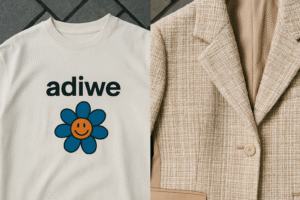Struggling to find streetwear brands that genuinely care about the planet? It's hard to know who's truly committed. I'll show you seven brands making a real difference in sustainable fashion.
Brands like Patagonia, Noah NY, and Story mfg. are leading sustainable streetwear by using eco-friendly materials, ensuring ethical production, promoting transparency, and innovating for a greener fashion future. They inspire change.
The fashion industry, especially fast fashion, has a significant environmental footprint. But a new wave of streetwear brands is proving that style and sustainability can go hand-in-hand. As a manufacturer at Adiwe, I see a growing demand from clients for more eco-conscious options, from customizable organic fabrics to transparent production processes. My clients, like Fifty Fifty in England, are increasingly aware that their customers care about where and how their clothes are made. It's inspiring to see brands not just talking about change, but actively leading it. Let's explore some of these pioneers.
How Has Patagonia Become a Benchmark for Sustainability in Apparel?
Tired of fleeting trends and flimsy clothes? Patagonia offers an alternative, focusing on durability and responsibility. Their approach has set a high standard for the entire apparel industry.
Patagonia leads through its ironclad commitment to environmental and social responsibility, producing durable, repairable gear, using recycled materials, advocating for fair labor, and funding environmental activism. They truly walk the talk.
!
Patagonia has been a sustainability pioneer for decades, long before it became a mainstream concern. Their philosophy isn't just about reducing harm; it's about actively doing good. For any streetwear brand looking at longevity and genuine impact, Patagonia offers a powerful case study. At Adiwe, we admire their dedication to quality craftsmanship, which aligns with our own focus on top-quality production.
Patagonia's Pillars of Sustainability:
- Built to Last (and Be Repaired): Their "Worn Wear" program encourages customers to repair, share, and recycle gear. This directly challenges the throwaway culture prevalent in fashion. They design products for durability, reducing the need for frequent replacement.
- Material Innovation: Patagonia has been at the forefront of using recycled materials (like polyester from plastic bottles) and organic cotton. They continuously research and implement more sustainable material alternatives. This is something many of my clients are asking for – access to innovative, eco-friendly fabrics.
- Supply Chain Transparency and Fair Labor: They are committed to fair labor practices and safe working conditions in their factories. They have programs like Fair Trade Certified™ sewn products, ensuring workers get a premium for their labor.
- Environmental Activism: Patagonia dedicates 1% of its sales to the preservation and restoration of the natural environment – "1% for the Planet." They are also vocal advocates for environmental causes.
Their approach shows that sustainability can be a core business driver, not just a marketing tactic. For streetwear brands, Patagonia’s model demonstrates how to build a loyal community around shared values and high-quality, responsibly-made products.
Why Is Noah NY Considered a Voice for Ethical Streetwear?
Searching for a streetwear brand that blends cool with conscience? Noah NY stands out by speaking up on social and environmental issues, proving style can have substance.
Noah NY leads by integrating high-quality production with a strong ethical stance, transparency about their supply chain, support for social causes, and a conscious rejection of fast fashion's harmful practices.
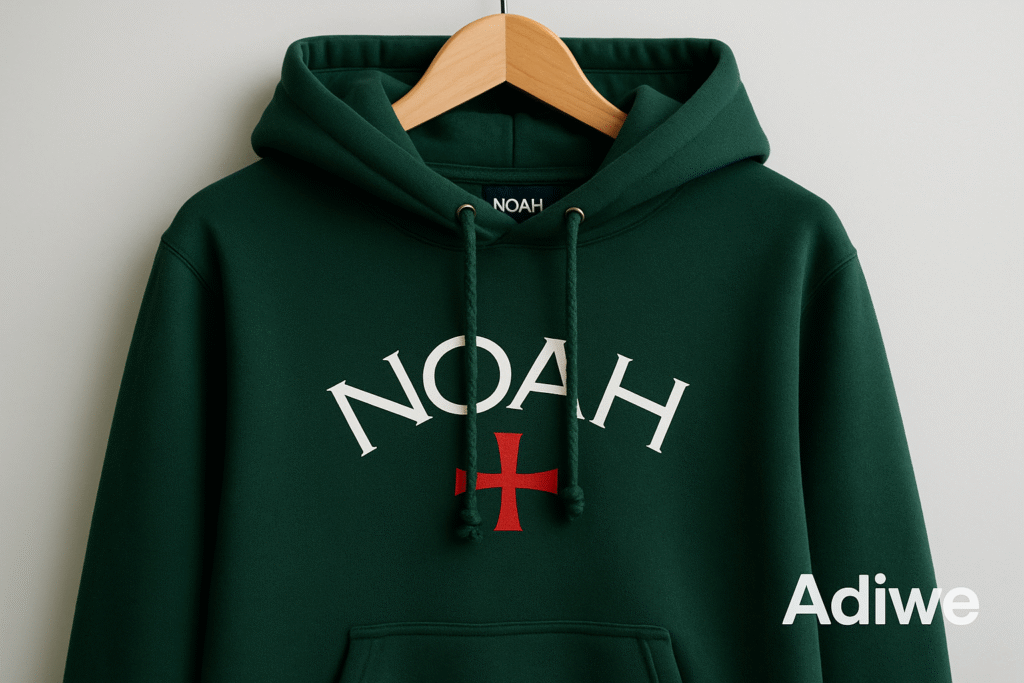
Noah NY, founded by former Supreme creative director Brendon Babenzien, has carved a unique niche in streetwear. They don't shy away from addressing complex issues, and their commitment to doing things differently is evident. As a B2B manufacturer, I see brands like Noah NY influencing the expectations of trend-focused clients who want more than just aesthetics; they want a story and values behind their products.
Noah NY's Approach to Conscious Streetwear:
- Quality Over Quantity: They focus on producing high-quality garments made in countries with good labor practices, often using premium materials from Italy, Japan, and the USA. This contrasts sharply with the mass-produced, low-quality model.
- Transparency and Honesty: Noah is open about where their products are made and the challenges of sustainable production. They often discuss issues like labor rights, environmental impact, and consumerism on their blog and social media.
- Anti-Fast Fashion Stance: They actively encourage customers to buy less and buy better. This message is critical in an industry often driven by hype and constant new drops.
- Giving Back: Noah frequently collaborates with or donates to organizations working on environmental conservation, human rights, and social justice.
For streetwear brands aiming to connect with a more discerning and ethically aware audience, Noah NY provides an excellent example of how to build a brand with integrity. Their focus on craftsmanship and making products that last, even if it means higher price points, resonates with consumers tired of disposable fashion. This is a trend we at Adiwe are equipped to support through our focus on top-quality materials and personalized design.How Does Story mfg. Champion Artisanal and Natural Processes in Streetwear?
Want unique streetwear that feels truly special and handmade? Story mfg. offers a refreshing alternative with its focus on natural dyes, traditional crafts, and a "positive product" philosophy.
Story mfg. leads by prioritizing natural, plant-based dyes, hand-weaving, organic fabrics, and a 'slow fashion' approach, creating distinctive, eco-conscious pieces that celebrate craftsmanship and artistic expression.
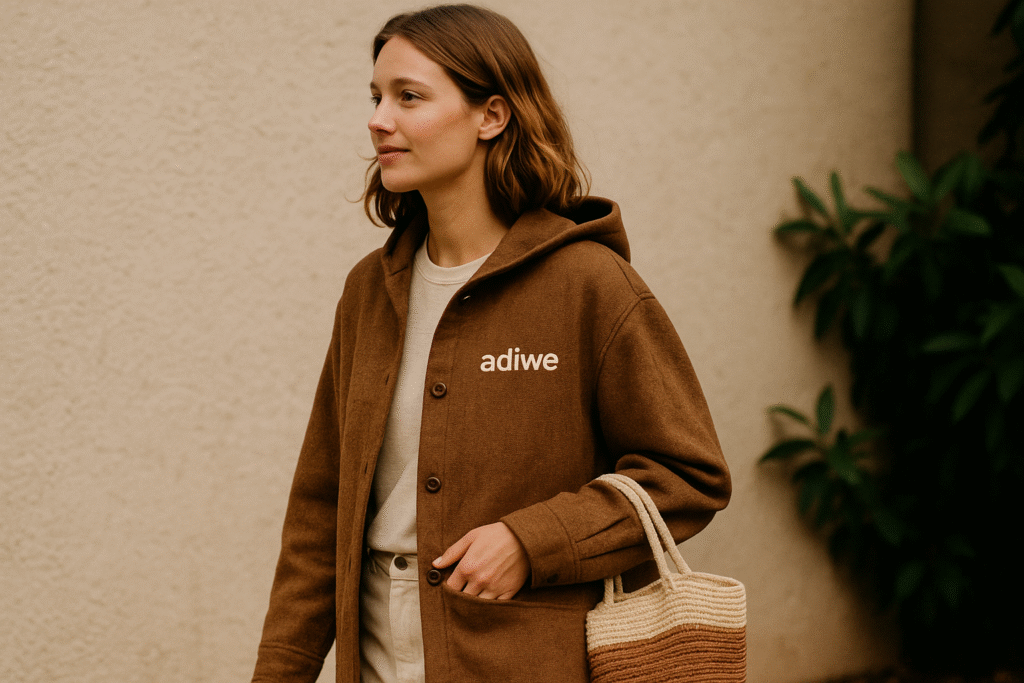
Story mfg. is a brand that truly embraces a different way of making clothes. Founded by Katy and Saeed Al-Rubeyi, their approach is deeply rooted in kindness – to people and the planet. For brands looking for truly unique, customizable aesthetics with a strong sustainable narrative, Story mfg. is a beacon. Their dedication to artisanal techniques is something I, as a factory owner, deeply respect.
The 'Slow' and 'Positive' Philosophy of Story mfg.:
- Natural Dyes and Materials: They are renowned for their use of natural, plant-derived dyes, which are less harmful to the environment than conventional synthetic dyes. They also prioritize organic and recycled materials.
- Artisanal Craftsmanship: Many of their pieces feature hand-weaving, hand-embroidery, and other traditional techniques, often created in partnership with artisan communities in India. This supports traditional skills and provides fair employment.
- "Positive Product" Approach: Their goal is to create products that are not just 'less bad' but actively good. This involves considering the entire lifecycle of a garment, from sourcing to end-of-life.
- Seasonless and Timeless Design: They move away from the traditional fashion calendar, creating pieces that are designed to be cherished and worn for years, rather than following fleeting trends.
Story mfg. demonstrates that sustainability can be a source of beauty and creativity. For streetwear brands that want to offer something truly different and connect with customers who value artistry and environmental consciousness, their model is highly inspiring. It shows how customizable fabrics and specialized craftsmanship can create a powerful brand identity.
How Is Stella McCartney Pushing Sustainable Innovation in High-Fashion and Beyond?
Think high fashion can't be truly sustainable? Stella McCartney has been proving critics wrong for years, embedding eco-principles into her luxury brand and influencing broader fashion.
Stella McCartney leads by championing cruelty-free materials (no leather, fur, or feathers), investing in sustainable material innovation, promoting circularity, and maintaining a transparent and ethical supply chain in luxury fashion.
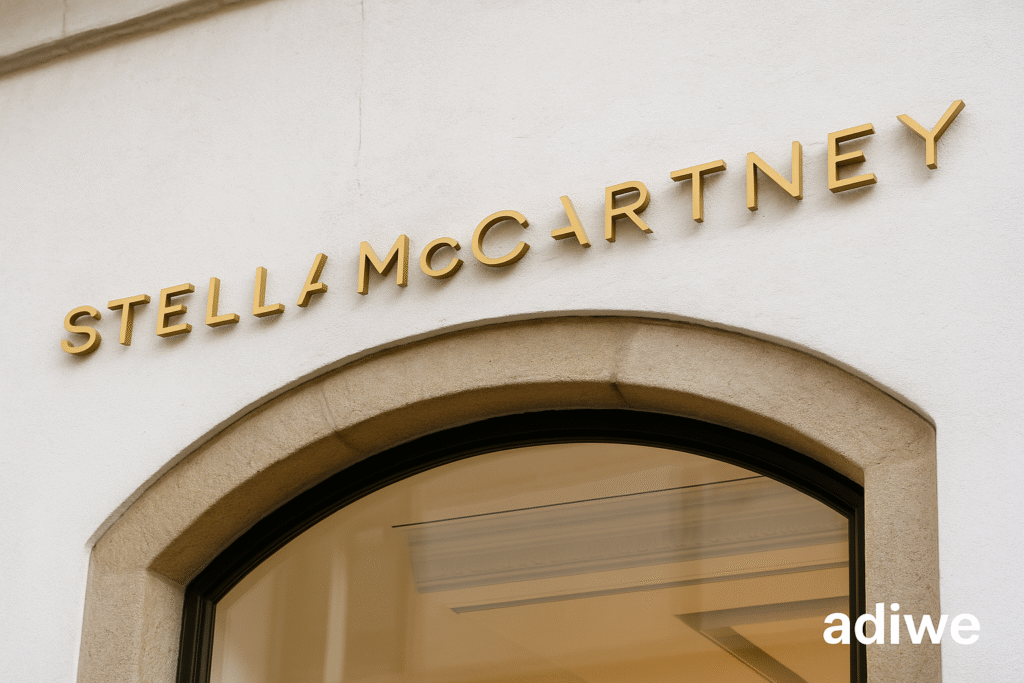
While Stella McCartney operates in the luxury space, her influence on sustainable practices is felt across the fashion spectrum, including streetwear. Her long-standing commitment to vegetarianism and environmentalism is woven into the fabric of her brand. For my clients who are trend brands, looking at how luxury pioneers approach sustainability can provide valuable insights for their own collections.
Stella McCartney's Impact on Sustainable Fashion:
- Cruelty-Free Pioneer: From day one, the brand has avoided leather, fur, feathers, and animal glues. This was radical for luxury fashion and has pushed the development of high-quality vegan alternatives. This resonates with the growing demand for ethical products.
- Material Innovation: They actively invest in and use innovative materials like recycled polyester, organic cotton, regenerated cashmere, and mushroom-based leather (Mylo™). This kind of R&D is crucial for the entire industry.
- Circular Economy Focus: Stella McCartney is exploring circular business models, including designing for longevity and recyclability, and supporting resale initiatives.
- Transparency and Advocacy: The brand is transparent about its sustainability efforts and challenges. Stella herself is a vocal advocate for industry-wide change.
Stella McCartney's work shows that sustainability and desirability are not mutually exclusive. Her brand’s success proves that ethical and environmental considerations can be integral to a high-end, trend-setting brand. For streetwear, which often draws inspiration from high fashion, these principles of material innovation and ethical sourcing are increasingly relevant.
How Does Outerknown Champion Ocean Conservation Through Its Apparel?
Concerned about the ocean's health and want to support brands that are? Outerknown, co-founded by surfer Kelly Slater, puts marine conservation and sustainable materials at its core.
Outerknown leads by using innovative recycled and regenerative materials, particularly those derived from ocean waste like fishing nets (ECONYL®), ensuring fair labor practices, and advocating for ocean protection.

Outerknown was born from a desire to create great clothing with a deep commitment to sustainability, especially concerning our oceans. Kelly Slater's connection to the sea provides an authentic foundation for the brand's mission. This is a powerful example for brands looking to connect their products to a specific cause. As a B2B supplier, we at Adiwe are seeing more requests for materials like ECONYL® as brands seek to tell similar stories.
Outerknown's Sustainable Waves:
- Focus on Recycled and Regenerative Materials: They are well-known for using ECONYL® regenerated nylon, made from fishing nets and other nylon waste. They also use organic cotton, hemp, and recycled polyester.
- Fair Labor Commitment: Outerknown is accredited by the Fair Labor Association and is committed to ensuring fair wages and safe working conditions for its garment workers. Many of their products are Fair Trade Certified™.
- Design for Durability: Reflecting a surfer's need for resilient gear, their clothing is designed to last, encouraging customers to buy less but better.
- Ocean Advocacy: The brand actively supports ocean conservation initiatives and uses its platform to raise awareness about marine plastic pollution and other environmental issues.
Outerknown effectively blends a laid-back, surf-inspired aesthetic with serious sustainability credentials. For streetwear brands, particularly those with an outdoor or coastal vibe, their approach to material innovation and cause-driven marketing is highly inspiring. It shows how a brand can build a strong identity around very trendy yet responsible products.What Makes Ninety Percent's Business Model a Leader in Ethical Fashion?
Want your purchase to directly contribute to good causes? Ninety Percent offers a unique model where they share a significant portion of their profits, empowering customers to vote for charities.
Ninety Percent leads by distributing 90% of its distributable profits between charitable causes chosen by customers and those who make the clothes, alongside using sustainable materials and ethical production.
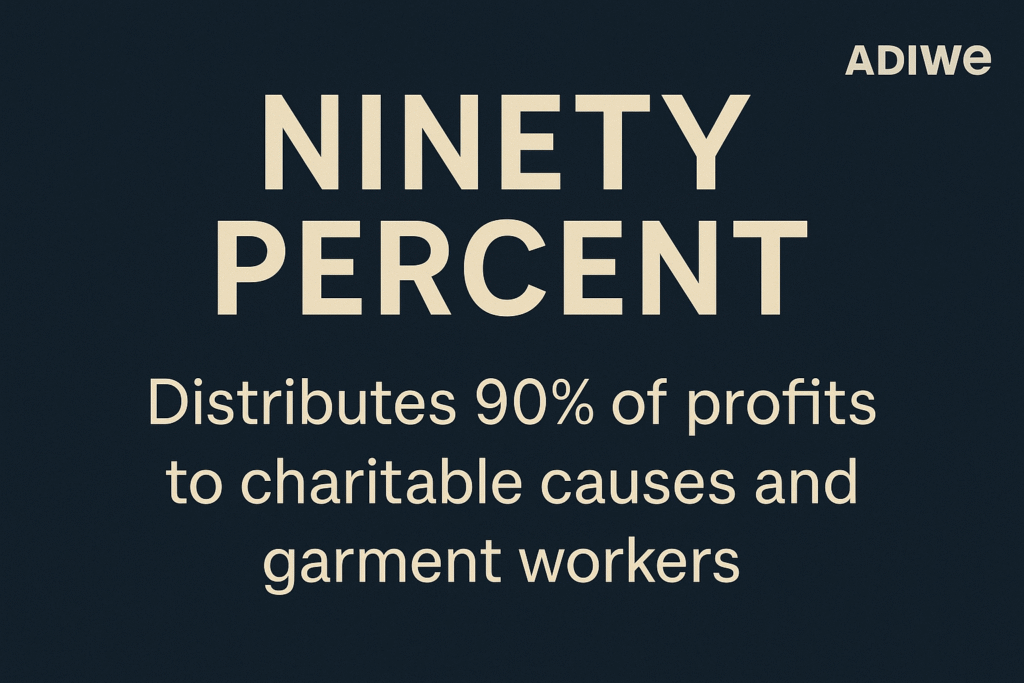
Ninety Percent has a truly disruptive business model that puts social responsibility at its very core. They're not just about making clothes; they're about making a difference. This resonates strongly with a growing number of consumers who want their spending to align with their values. For brands exploring new ways to engage customers and build community, Ninety Percent’s approach is worth studying.
Ninety Percent's Unique Approach:
- Profit Sharing for Impact: This is their most distinctive feature. Customers can vote (using a code on the garment's care label) for one of several partner charities, and a portion of the profits goes to these causes. Another portion is shared with the garment workers.
- Sustainable Materials: They prioritize the use of materials like TENCEL™, organic cotton, and recycled fibers, focusing on softness, durability, and lower environmental impact.
- Ethical Production: They work closely with suppliers, primarily in Bangladesh, to ensure fair wages, safe working conditions, and worker well-being. They are transparent about their manufacturing partners.
- Timeless Essentials: Their collections focus on high-quality, versatile essentials designed to last, rather than fast-fashion trends.
Ninety Percent demonstrates that a business can be structured around generosity and shared value. This model of involving customers in charitable giving creates a strong sense of connection and purpose. For streetwear brands looking to deepen their community engagement and social impact, this offers an innovative framework. It also highlights the importance of transparent and ethical relationships with manufacturing partners, something we prioritize at Adiwe.
How Are Veja Sneakers Paving the Way for Sustainable Footwear in Streetwear?
Looking for stylish sneakers that don't compromise on ethics or a_sustainability? Veja has become a go-to for conscious consumers, proving that transparency and eco-materials can be cool.
Veja leads by using ecological materials like wild Amazonian rubber, organic cotton, and innovative recycled fabrics, ensuring fair trade sourcing, and maintaining radical transparency throughout its supply chain for its popular sneakers.
Veja has achieved cult status in the sneaker world without traditional advertising, relying instead on transparency and a genuinely sustainable product. While they specialize in footwear, their impact on how brands approach sustainability is significant for the entire streetwear scene. As a manufacturer, I've seen how Veja's success has influenced demand for more eco-conscious material options, even for apparel.
Veja's Sustainable Steps:
- Eco-Friendly and Fair Trade Materials: They use organic cotton from Brazil and Peru, wild rubber from the Amazon rainforest (supporting local communities and fair prices), and innovative materials like B-Mesh (made from recycled plastic bottles) and vegan leather alternatives.
- Transparency: Veja is incredibly open about its production processes, costs, and challenges. They publish detailed information about their factories, material sourcing, and social audits.
- Ethical Production: They work with factories in Brazil that uphold high social standards and ensure fair wages and good working conditions.
- Minimalist Marketing: Veja famously spends very little on advertising, investing instead in their supply chain and materials. Their popularity has grown organically through word-of-mouth and the appeal of their product and philosophy.
Veja proves that a commitment to sustainability and transparency can be a powerful brand builder. Their success demonstrates that consumers are willing to support brands that are doing things differently and responsibly. For any streetwear brand, especially those offering accessories or footwear, Veja’s model of combining style, ethics, and eco-consciousness is a powerful lesson.Conclusion
These seven brands showcase diverse paths to sustainable and ethical streetwear. They prove that conscious choices in materials, production, and business models can lead to impactful and desirable fashion.


